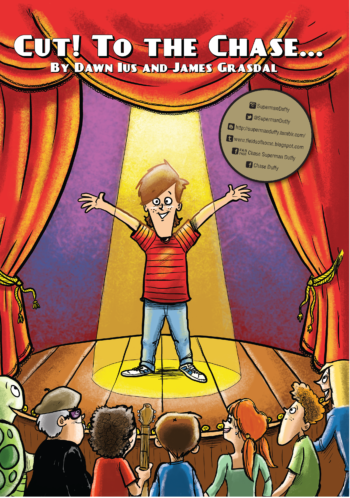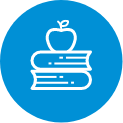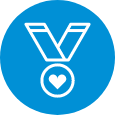
Grade 2 Learning Objectives for “Cut! To the Chase”
Jump to Subject

English Language Arts
General Learning Objective
1. Students will listen, speak, read, write, view and represent to explore thoughts, ideas, feelings and experiences.
Specific Learning Objectives
1.1 Discover and explore
Express ideas and develop understanding
- Contribute relevant ideas and information from personal experiences to group language activities
- Talk about how new ideas and information have changed previous understanding
- Express or represent ideas and feelings resulting from activities or experiences with oral, print and other media texts
Experiment with language and forms
- Use a variety of forms of oral, print and other media texts to organize and give meaning to experiences, ideas and information
1.2 Clarify and Extend
Consider the ideas of others
- Connect own ideas and experiences with those shared by others
Extend understanding
- Find more information about new ideas and topics
General Learning Objective
2. Students will listen, speak, read, write, view and represent to comprehend and respond personally and critically to oral, print and other media texts.
Specific Learning Objectives
2.1 Use Strategies and Cues
Use prior knowledge
- Use knowledge of how oral and written language is used in a variety of contexts to construct and confirm meaning
- Connect personal experiences and knowledge of words, sentences and story patterns from previous reading experiences to construct and confirm meaning
- Use knowledge of the organizational structures of print and stories, such as book covers, titles, pictures and typical beginnings, to construct and confirm meaning
Use comprehension strategies
- Apply a variety of strategies, such as asking questions, making predictions, recognizing relationships among story elements and drawing conclusions
- Identify the main idea or topic and supporting details of simple narrative and expository texts
Use textual cues
- Preview book covers and titles; look for familiar words, phrases and story patterns to assist with constructing and confirming meaning assist with constructing and confirming meaning
2.2 Respond to Text
Construct meaning from texts
- Connect situations portrayed in oral, print and other media texts to personal and classroom experiences
- Retell the events portrayed in oral, print and other media texts in sequence
- Discuss, represent or write about interesting or important aspects of oral, print and other media texts
- Express thoughts or feelings related to the events and characters in oral, print and other media texts
2.3 Understand Forms, Elements and Techniques
Understand forms and genres
- Recognize that ideas and information can be expressed in a variety of oral, print and other media texts
Understand techniques and elements
- Identify main characters, places and events in a variety of oral, print and other media texts
- Identify how pictures, illustrations and special fonts relate to and enhance print and other media texts
Experiment with language
- Demonstrate interest in the sounds of words and word combinations in pattern books, poems, songs, and oral and visual presentations
General Learning Objective
3. Students will listen, speak, read, write, view and represent to manage ideas and information.
Specific Learning Objectives
3.1 Plan and Focus
Focus attention
- Relate personal knowledge to ideas and information in oral, print and other media texts
- Ask questions to determine the main idea of oral, print and other media texts
3.2 Select and Process
Access information
- Use given categories and specific questions to find information in oral, print and other media texts
3.3 Organize, Record and Evaluate
Organize information
- Categorize related ideas and information, using a variety of strategies, such as finding significant details and sequencing events in logical order
Record information
- Record key facts and ideas in own words; identify titles and authors of sources
3.4 Share and Review
Share ideas and information
- Share, with familiar audiences, ideas and information on topics
- Clarify information by responding to questions
General Learning Objective
4. Students will listen, speak, read, write, view and represent to enhance the clarity and artistry of communication.
Specific Learning Objectives
4.3 Present and Share
Demonstrate attentive listening and viewing
- Ask relevant questions to clarify understanding and to have information explained
- Show enjoyment and appreciation during listening and viewing activities
General Learning Objective
5. Students will listen, speak, read, write, view and represent to respect, support and collaborate with others.
Specific Learning Objectives
5.1 Respect Others and Strengthen Community
Appreciate diversity
- Discuss the experiences and traditions of various communities portrayed in oral, print and other media texts
- Ask for and provide clarification and elaboration of stories and ideas
Relate texts to culture
- Discuss similarities and differences in settings, characters and events in oral, print and other media texts from various communities

Health
Topic: Personal Health
General Learning Objective
Wellness Choices
Students will make responsible and informed choices to maintain health and to promote safety for self and others.
Specific Learning Objectives
W–2.1
- Describe the effects of combining healthy eating and physical activity
W–2.2
- Examine the need for positive health habits; e.g., adequate sleep, sun protection
W–2.5
- Classify foods according to Canada’s Food Guide to Healthy Eating, and apply knowledge of food groups to plan for appropriate snacks and meals
